Innovative ASUS solutions in the learning process
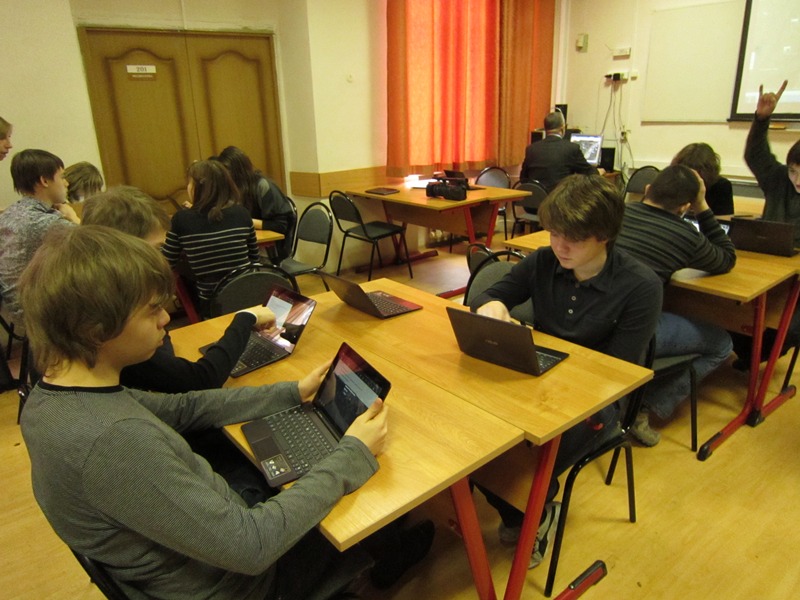
Recently, representatives of ASUS 'Moscow office visited an open geography lesson in the eighth grade of the Lyceum of Information Technologies No. 1533 , which began using ASUS Eee Pad Transformer Prime tablet computers.
Until today, neither Lyceum No. 1533, nor other Russian educational institutions have used tablet computers for educational purposes. Now only in a few schools of Russia there is an experiment in working with interactive multimedia electronic textbooks, which are cheap e-books with a simplified operating system and other technical limitations. Interactive boards are more actively used, however, they also have several disadvantages.
')
Lyceum of Information Technology № 1533 (LIT) is a public educational institution (since 1992 - an associated school of UNESCO), focused on working with students who have completed grades 7-8 of a secondary school, have passed competitive interviews and are ready for intensive work based on the use of information and communication technology (ICT). The educational process at the Lyceum covers grades 8-11. All graduates of the Lyceum go through a three-year cycle of specialized training (grades 9-11), culminating in the protection of graduation projects. After graduating from the Lyceum and the IT profile department, most graduates become specialists in large IT companies (Yandex, Google, Microsoft, ABBYY, Kraftway, Kaspersky Lab. And many others). Such a platform is the best testing ground for educational experiments.
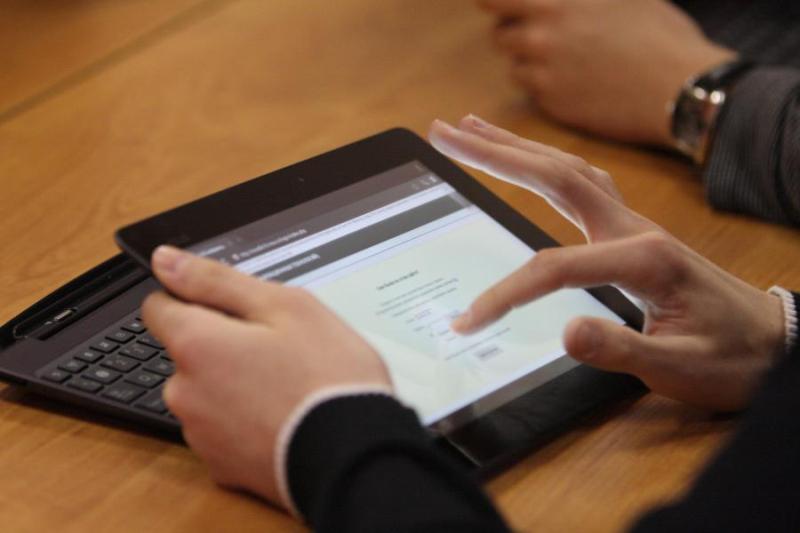
When each student has his own personal mobile device (and in our time - and not one), the educational sphere especially needs to introduce progressive solutions. According to official data, the number of personal computers used for educational purposes in institutions that implement general education programs is more than 900,000. Of these, only a few tens of thousands are laptops (mostly outdated). It should be noted that the lyceum conducts training with the help of laptops and with the help of desktops using a wide variety of operating systems. In November last year, the administration of the school finally formed the idea of what kind of instrument students and teachers needed. It was then that information appeared about the imminent launch of the ASUS Transformer Prime tablet. Updating a computer park is a difficult task for a budget institution (free education at a lyceum), but ASUS went to a meeting and fully satisfied the needs of LIT.
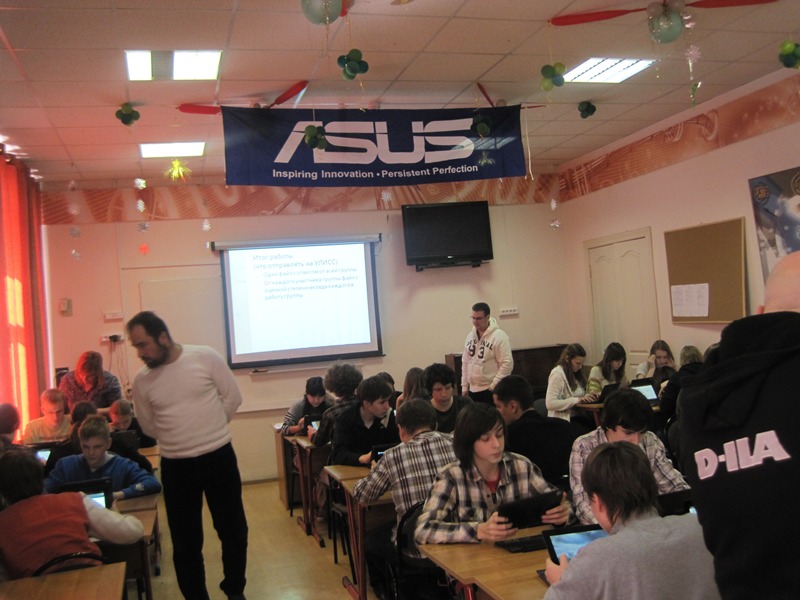
Now on tablet computers ASUS Eee Pad Transformer Prime, children of 8 - 11 classes are trained. The lyceum is equipped with two full classes: the company supplied 50 cars (tablet + docking station). Due to its mobility, devices are successfully used in classrooms of general education disciplines: geography, history, chemistry, biology, literature and the Russian language. The next step is the development of specialized training courses on mobile application programming.
I was able to attend an open lesson where students first used ASUS tablet computers. At the beginning of the lesson, in five minutes, the students were given out tablets and explained the principles of work. That's all, no additional training was conducted. Almost everyone is familiar with devices, Android 4.0 has not caused additional questions. At this stage of training, third-party software is not used, and the entire lesson actually takes place in a browser window, based on the UILISS learning platform (is there a subtle allusion to “Valis” by Philip Dick, unfortunately, failed to find out :).
Educational Lyceum Information and Networking System (ULISS) - electronic storage of educational materials of the Lyceum with the provision of joint access. There is an electronic journal and diary, where the student, teacher or parents of the student can always see the grades and homework. Only teachers (each in their own subject) and curators of streams can make changes to an electronic journal. In a visual learning environment, both demonstration of training materials and test testing are performed. Uliss is a version of the Moodle 2.0 Learning Management System ( LMS ) that has been significantly reworked for the realities of high school education. The system was fully completed by the staff of the Lyceum.

During the lesson, the students worked with a contour map of the terrain, on which it was necessary to pick up names to significant points on the map. By the way, the journalists from Nizhny Novgorod, Kostroma and Yaroslavl who were present at the meeting could not move forward :) During the lessons with tablets, students study for 3 - 4 people in a group. And this is a new quality of work in the classroom, mutual assistance and a collective search for solutions. And there is no need to hide your tablet from the look of the hooligan troechnik. The result of the work (which is sent to UILISS) is a file with the answer from the whole group, and a file with an estimate of the degree of contribution of each to the work of the group.
The logical question is, is the choice of a tablet so important, if of all its possibilities only the default browser is used? We were assured that in a few months the development of additional applications will end. For example, in the history lesson it will be necessary to make a genealogical tree, choosing the appropriate icons. The learning process is transformed by doing it in the form of a game, which, in turn, is as well as possible feasible on tablet computers.
The student-tablet interaction is primarily a tactile process (the finger touches the screen). Nobody forgets about the importance of developing motor skills and the need to use the skills of handwriting (however, the world scientific community has not yet given an unequivocal answer about the true importance of the ability to own a pen), but the stylus is not used in the learning process. However, nothing prevents this from changing, because ASUS Transformer Prime supports handwriting input as well.
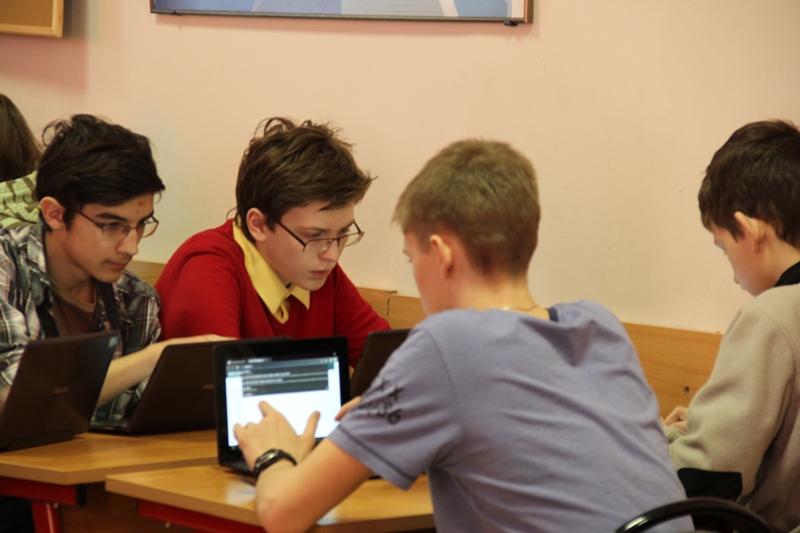
Another important issue is the impact on schoolchildren’s vision. And although the topic " eInk: good or harm? ”Habra users actively discussed all possible (and impossible) harm, it was not possible to work out a common opinion on this matter. Lyceum has its own approach, based, among other things, on SanPiN. Its main idea is that children do not spend 40 minutes of a lesson, staring at the screen, most of the time they are in the process of discussion and are only asked to get a tablet for receiving a question and entering answers. And for some reason everyone forgets that nothing prevents children from spoiling their eyesight at home, with ordinary books :)
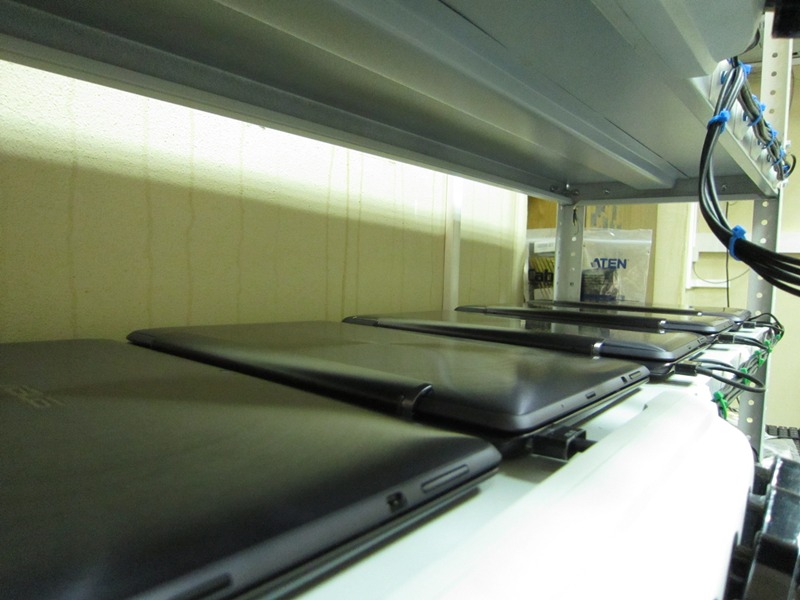
The educational process is organized simply: at the beginning of the lesson the children are distributed the tablets, at the end they are collected back. Taking home, unfortunately, is impossible.
I know that many people will ask why the choice was made in favor of ASUS Transformer Prime, when the market is overwhelmed with such numerous offers. There is nothing supernatural in this, if you know the basic capabilities of the device or familiarize yourself with them for at least a day or two. Prime is a combination of functionality and accessibility. Transformer Prime is lightweight (586 grams), children can easily hold it in their hands, while the tablet is made of a reliable strong metal case. The NVIDIA Tegra 3 processor provides sufficient performance in the educational process. The battery lasts for 10 hours (without a docking station), which allows you to use the tablet throughout the school day. High-quality IPS-display with good brightness does not tire the eyes. Needless to say, it simplifies the learning process using a hardware keyboard. The pre-installed software includes the Polaris Office suite, which allows you to work with files in Word, Excel and PowerPoint formats.
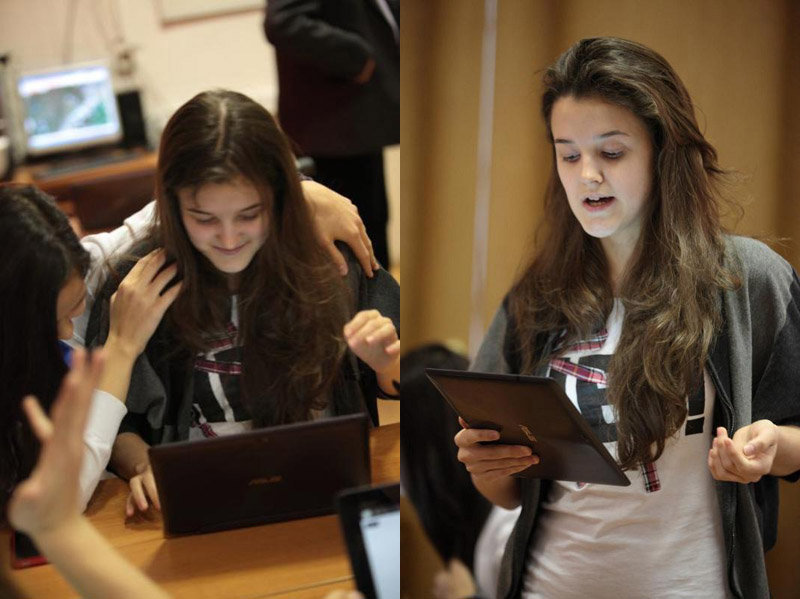
I want to believe that with the help of new technologies it will be possible to qualitatively improve the learning process. In one lesson, it was noticeable that students enjoyed working with the ASUS Eee Pad Transformer Prime (and in my childhood it was cool to pick at a school pencil case with numerous secret compartments in my lesson :). But the question is, will it be possible to make a revolution in the field of education in general? Schools, Lyceums, even institutes hopelessly lagged behind real life. “Fundamental foundations” no longer suit anyone. At refresher courses for teachers tell common truths twenty years ago. And no innovation will help, if in the field of IT teachers will know less than their students.
Source: https://habr.com/ru/post/140808/
All Articles